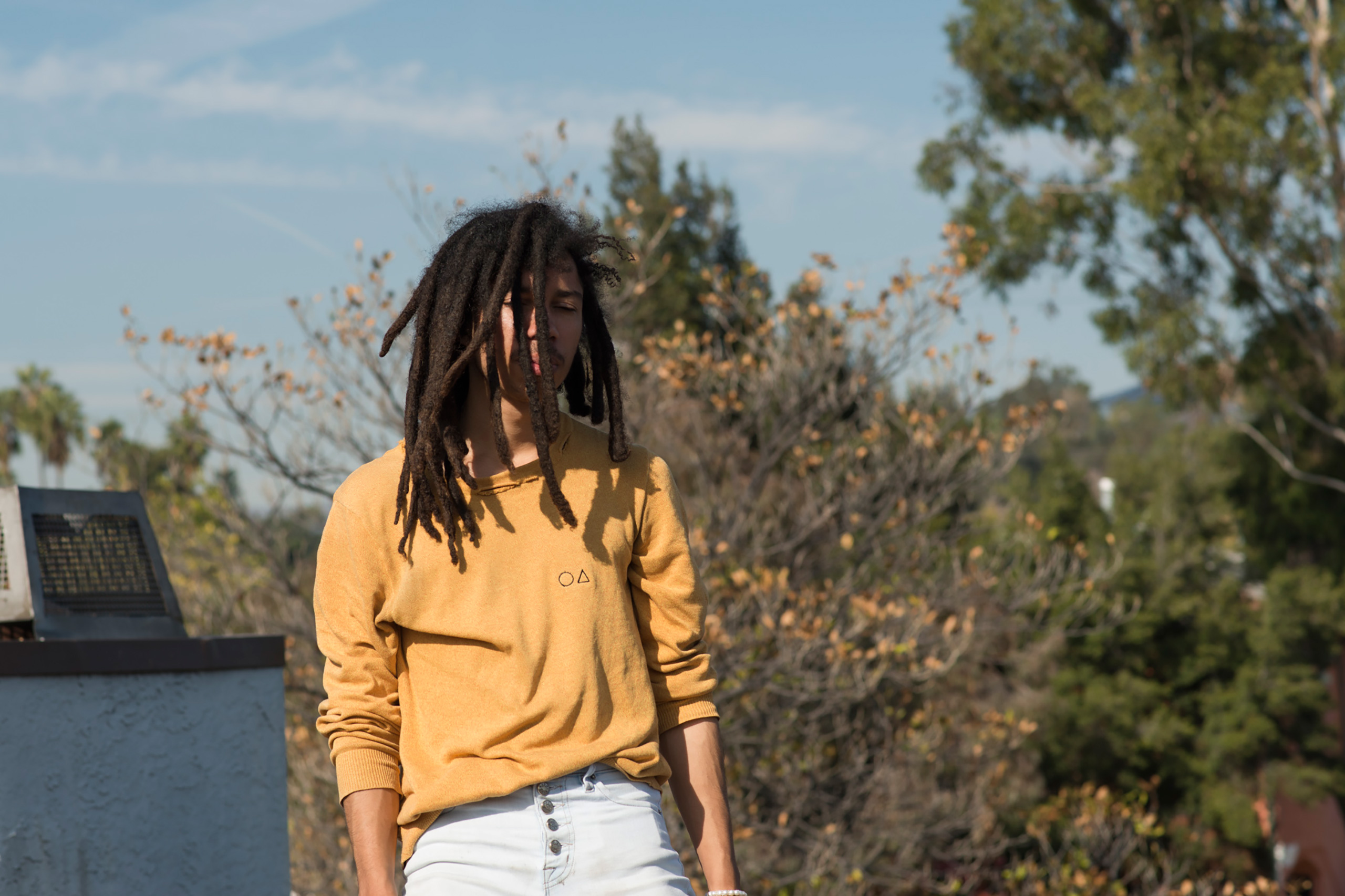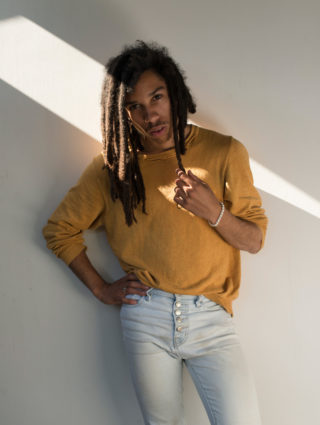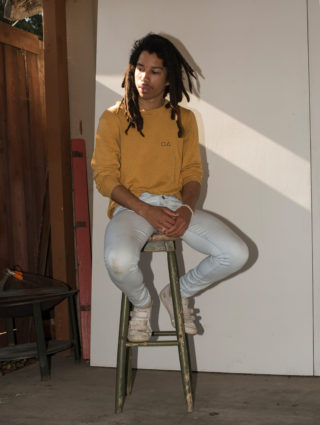London O’Connor – The nowhere boy with a recording studio in his backpack
The 25-year-old from San Marcos, CA seems to have been on the move from day one

London O’Connor is reclining in a friend’s backyard, soaking up the morning Californian sunshine as his body stretches into life. It’s much balmier than the east coast he now calls home and he isn’t looking forward to his impending return to New York’s cold and dark November as he cradles his mug of tea in cupped hands and lifts his shoulders into a shiver at the thought of it. It’s just another day in the peripatetic life of a 25-year-old San Marcos, CA native who seems to have been on the move from day one.
Since leaving home aged 18, he’s lived perpetually out of a suitcase. Well, a backpack to be precise, to the point where it’s become his calling card. “All records written, produced and performed by London O’Connor,” read the liner notes accompanying his debut album, “From my backpack.” It’s something he’s become used to and he’s come to find the idea of a fixed address hard to imagine. “I haven’t had a permanent spot for, like, two years. I’ve just been travelling and living on people’s couches and being wherever. Since I left San Marcos I’ve been pretty much living in New York, but I’ve been moving around and shit.”
This itinerant lifestyle has become a deeply ingrained part of O’Connor’s personality and of the art he produces from the small collection of mobile hardware he manages to drag around. “You write songs differently when you get to sit on the floor of a kitchen as opposed to being in a studio that’s all vacuum-sealed,” he muses. “It’s different when you can be that transparent with your environment. And I’ll always want to be that transparent.”
That desire for authenticity was a central driving force in producing the awkwardly-named-but-wonderfully-executed O∆ (it’s pronounced ‘Circle Triangle’), a stunner of a debut album that will finally get a proper release in February, nearly two years after it first caused waves through Soundcloud and old-fashioned word of mouth. It seems apt that the spawn of a man who is yet to find a permanent residence took some time to find a home of its own. And yet it doesn’t phase him. When I ask if he would like to have been afforded the chance to live and record in a space of his own, he takes the first of many long pauses, which are to become a feature of our conversation, before explaining how it all fits in on the road to the end goal.


“Whether or not it’s an advantage or a disadvantage in some ways, that’s just what I have. Artists have to start out with whatever they have. I had a laptop, I had Internet, I had plug-ins, I had whatever mic I could fit in my backpack, I had my cell phone,” he reasons. “So you just work with whatever you have.”
That’s not to say O’Connor isn’t envious of the resources behind the slick pop you hear on the radio, just that he’s waiting patiently to access them. And when he does, he wants to make music that’s real. “You grow up in supermarkets and grocery stores and malls. They’re always playing this really well-produced pop music. And you look at the tools they have. Some of that I would like, but a lot of it I just thought, ‘This is just shit – they’re just lying to me. This whole place is lying to me and it’s playing music through its speakers that are lying to me.’ But it’ll fucking sound good!” He crumples up in laughter as he exclaims his frustrations. “And I always wanted that level of infrastructure for everything I did. I always wanted to do it in the biggest, cleanest possible way.” And the backpack recording studio is a means to an end, on that point he is crystal clear. “I never thought, ‘It’s cool that I’m making stuff with these resources.’ It’s more like, well, this is level one for me. This is how it starts.”
And will he settle down? Cue another deep breath. “It would be cool to really have a bedroom. To put a piano in it and just make the best stuff I can and look out at the same nice view every day.” He stares into the distance as though imagining what that view might look like before snapping himself back into the here and now. “It would be cool at some point.”
In a way it will be a shame when that day finally rolls around. It’s easy to over-egg the poetry of the DIY ethic, but a large part of O∆’s joy is its unashamed rawness. It’s rough around the edges, shorn of overproduction, and it feels all the lighter and more engaging for it. The melodies are up front, strobing lines of synth, the percussion foregrounded. The grooves are there but this is a modern Quincy Jones with a single MIDI controller, forced to make what he can from what he has. And his voice – a strange and fascinating gift – somehow hovers, from verse to chorus, between rapping and falsetto. It breaks from time to time and it goes out of tune, but voices do, don’t they?
Yet while the music draws from a palette of primary colours, O’Connor’s lyrical narratives deal with a much more nuanced set of greys. Ranging from life’s mundanities and the need to escape them (‘Oatmeal’) to technological scepticism (‘Nobody Hangs Out Anymore’) to love (‘Love Song’) and out-and-out hatred (‘Guts’), O∆ covers an impressive spectrum of emotions across a collection of cinematic scenes dexterously built from the simplest of language. “That’s the way I see life and the world,” he explains of his visual approach. “I saw this movie, Moonlight, recently and it fucked me up. And there’s this scene where this mother is saying some wild shit. This is why kids grow up fucked up,” he smirks. “It’s a traumatic moment. But the colours in this moment – emanating from behind that mom – are mesmerising. If you pay attention to your surroundings, life is fucking gorgeous.” The highs and the lows, for him, are intertwined, and they’re all there to be experienced. “Even when you’re angry. It’s just a colour. So I want to not be one-dimensional, I want to be fair to life.”
A rarity among musicians, O’Connor has a laissez-faire approach to social media, treating it with a healthy suspicion. When he talks about the decision, his rationale demonstrates wisdom beyond his years. “The thing I wanna say about the Internet,” he starts before trailing off as he gets his words in order.
“The Internet is clearly the most important thing that’s happened to humanity while I’ve been alive,” he states forthrightly. “I’m just a kid growing up in it. I’m just going through all of the same shit that every human goes through, trying to find connections with people but not knowing if I can trust people, trying to get a girlfriend, but I’m growing up in the Internet.” As he talks I begin to re-evaluate my own relationship with the web, and start to feel like a very, very small dot in a very large timeline. He’s right, of course. “Sometimes I think about how surreal that is, and how much better people will understand how surreal that is in the future. So I’m just trying to make art about my experiences, and growing up in that is part of it. I just want a real life – I want everything I do here to be real!”
And yet O’Connor isn’t shunning technology. This isn’t some Luddite; it’s the echo chamber that it can create which he struggles with on a daily basis. “It’s just saying shit to be retweeted,” he opines. “So that our sentiments can be voted for their popularity.” Instead, he prefers 1-to-1 communication. And it’s that want to reach out and to have genuine, bona fide human connections that propels him. Rather than tweeting regularly, he has given his phone number out to fans, opening up a world of connection in less than 140 characters: “If you’re from nowhere I’m here till my phone explodes 858 232 9290.”
It has led to hours of fruitful conversation with his followers as O’Connor takes it upon himself to lead a movement of people, as he puts it, “from nowhere.” Nowhere – a word that crops up again and again, is the faceless suburbs like the ones he grew up in, where days are spent in shopping centres and in bedrooms, wondering how to get out of them and break the cycle. “Kids will show up from nowhere on my phone and we’ll talk – and we’ll really talk. It’s not just a line. That’s been cool to see that, to see people who felt exactly the same way that I felt growing up.”
In the late ’90s and early 2000s he didn’t have anyone to show him the way out, and he clearly feels lucky to have opportunity to do so in however small a way. “If I go back to the mall and you listen to the radio and there’s this person who acts nothing like you, who looks nothing like you, who cares about all this shit that is not your life, who is getting to process their life experiences and then put them out in crystal clear sound, with perfect instrumentation… they do that and the resounding response of that is that you just feel left out.” That, he says, is why he started making music at the age of just ten. “I wanted to break that. I wanted to make vulnerable pop music that mattered, for every kid that was like me. To take those experiences and turn it into beautiful art.” His music, then is for the daydreamers, for the not-quite-popular, and crucially for the vulnerable.
I suggest that it’s a lot of pressure to put on just one set of shoulders but again the response is circumspect. London O’Connor, it seems, has thought through his response to everything. “I already put so much pressure on myself just to get my ideas out with the clarity that they have in my mind. There’s a lot of space in me that I’m trying to get out. If I do that, that’s all that matters to me.” His youthful exuberance bubbles up as he asserts his determination to stay true to the values that shaped O∆ and his work thus far. “I don’t care if I had a million fans and half the world was waiting on my album. If it’s me making an album I already know that I’m approaching it with so much care and intensity that whatever pressure they would have there would be more pressure that I would be putting on myself.”
And so I wonder where that pressure will lead him over the next year, over the next two years and over the next decade. Again, it all seems mapped out. “I want to do some shit for humanity that’s not conventional,” he counters. “I want to make tools that help people do that. Music is a tool. Music got me out of the suburbs, because it gave me an idea when I was young enough. Brian Eno helps me sleep at night. His music is a tool.” His voice quickens as the string of ‘I wants’ come tumbling forth. “I want to take all of the experiences that I have felt since first leaving home and I want to put them together in the most honest album I can. That’s just the next 12 months,” he says firmly, lest I think he might be done.
“I want to tour Circle Triangle and I want to play that shit to kids in every nowhere on earth that’s like the nowhere that I’m from. I want to create space for people.” He looks down sheepishly, grinning to himself before he raises his stare once again. “And I want a bedroom with a piano and a yellow flag on my wall!”